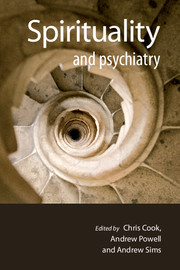Book contents
- Frontmatter
- Contents
- List of contributors
- List of tables, boxes and figures
- Foreword
- Preface
- The Spirituality and Psychiatry Special Interest Group of the Royal College of Psychiatrists
- 1 Spirituality in psychiatry
- 2 Assessing spiritual needs
- 3 Psychosis
- 4 Suicide
- 5 Child and adolescent psychiatry
- 6 Psychotherapy
- 7 Intellectual disability
- 8 Substance misuse
- 9 Neuroscience of the spirit
- 10 Spiritual care in the NHS
- 11 The transpersonal perspective
- 12 Religion and religious experiences
- 13 Pathological spirituality
- 14 Ageing
- Index
4 - Suicide
Published online by Cambridge University Press: 02 January 2018
- Frontmatter
- Contents
- List of contributors
- List of tables, boxes and figures
- Foreword
- Preface
- The Spirituality and Psychiatry Special Interest Group of the Royal College of Psychiatrists
- 1 Spirituality in psychiatry
- 2 Assessing spiritual needs
- 3 Psychosis
- 4 Suicide
- 5 Child and adolescent psychiatry
- 6 Psychotherapy
- 7 Intellectual disability
- 8 Substance misuse
- 9 Neuroscience of the spirit
- 10 Spiritual care in the NHS
- 11 The transpersonal perspective
- 12 Religion and religious experiences
- 13 Pathological spirituality
- 14 Ageing
- Index
Summary
The understanding and management of suicide is a critical part of the practice of psychiatry. Spirituality is concerned with life, death and meaning, and so it may be said that it is concerned with the understanding of suicide. We will approach this vast subject by considering: membership of faith communities and spiritual practices, attitudes to suicide in faith traditions, spirituality and mental anguish, suicide in literature, the question of the meaning of life, spiritual issues in the clinical management of people who have suicidal thoughts, physician-assisted suicide, and the impact of suicide on survivors.
From the legal perspective, suicide was considered in the UK to be a crime, insofar as it was deemed to constitute self-murder. It followed that attempted suicide was attempted murder, which could result in the tragic irony of individuals being punished by death for trying to kill themselves (an example is cited in Alvarez, 2002: p. 63). The law changed in 1961; suicide is now seen as an issue for the helping professions rather than the law.
Religious attitudes to suicide have generally underpinned the legal position and used to be similarly condemnatory. However, these have become more humane over time and the emphasis has shifted to one of compassion for the deceased and support of the bereaved.
The effect of spiritual practices and membership of faith communities on suicide
Émile Durkheim (1858–1917) remains one of the most quoted authors on suicide. He approached it from a social rather than an individual perspective, seeing it as dependent upon factors external to the individual, such as the level of social integration. This was defined along two dimensions: the individual's sense of community and the community's control over the individual, disturbance to the balance of these two factors increasing the chance of suicide. Durkheim described four states that can threaten the equilibrium between the individual and the community: where the bond between the two is too strong, leading to either altruism or fatalism, and where the bond is too weak, resulting in egoism or anomie (Bille-Brahe, 2000).
Durkheim also observed that suicide rates were lower for Catholics than for Protestants and ascribed this to a difference in religious emphasis between the certainty of dogma and the individual conscience.
- Type
- Chapter
- Information
- Spirituality and Psychiatry , pp. 61 - 80Publisher: Royal College of PsychiatristsPrint publication year: 2009



